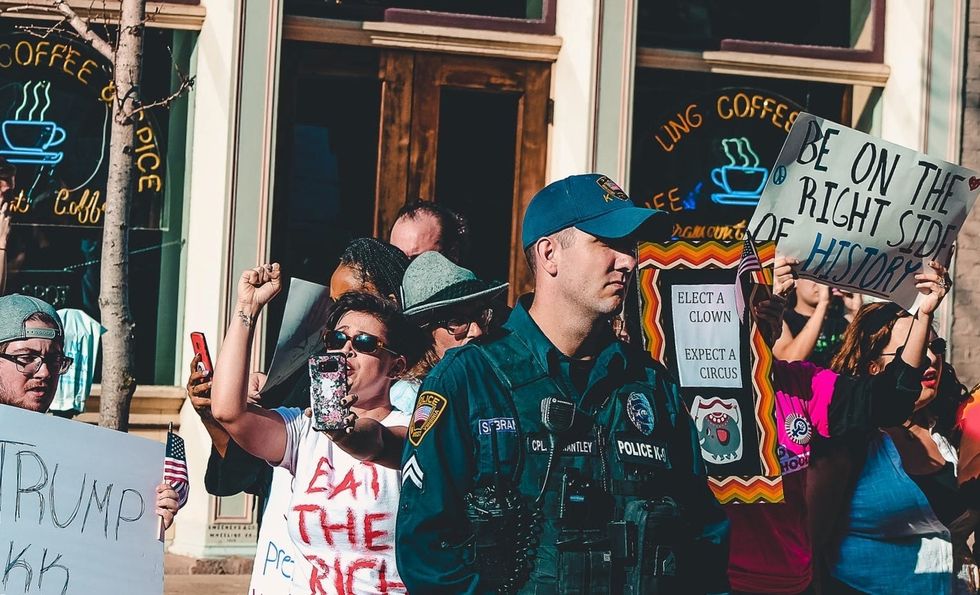Democracy is the government system that gives power to people. Since the beginning, the main discussion was not only about fighting against its opponents but also debates within its supporters. The main discussion has always been the definition of "demos," the rules and the institutes necessary for democracy to function properly, and understanding the influence of this type of regime on government and social lives.
The modern democracy takes its roots in ancient Greece and Rome, but the golden standard is assumed to be the government structure of the Athens, which was formed in 507 B.C. and has been untouched for two centuries.
At the modern times after signing Magna Carta by the British Monarch, the new form of democracy appeared. By the end of the 15th century, the enactment of laws in England required not only the King's will but the Parliament's, too. Later these tendencies started to spread out around Europe. It has been more than eight centuries now.
We live in a world where a lot of different races, nations, and religions exist. Every culture is unique but at the same time every one of those compliments and brings each other together. We need to remember that each nation has its own mentality, customs, and traditions. I am afraid that brokers from Wall Street won't find too much in common with the Bedouins from Jordan or with Pashtuns from the Paktika region.
Not all the nations are ready to embrace the democracy the way it was formed in the Anglo-Saxon world. Moreover, most of the times when the "freedom regime" is being imposed by outside interferences (by brute force or by establishing puppet regimes), it leads to the nation's explosion: anarchy, the states break down, or religious radicals take over, which sets countries back to the dark medieval times. This is also usually accompanied by bloody clashes, thousands of people's lives, and millions of refugees.
This perspective is obviously most applied to the Muslim countries. One illustrative example is the Arab Spring, which was the wake of protests and condemnations happening in the Arab world starting at the beginning of 2011. The most dramatic events occurred in countries like Tunisia, Egypt, Yemen, Libya, Syria, Iraq, etc. Clearly, the ruling regimes in these countries were far away from democracy. The heads were called the Presidents and the form of the government had the essentials to democracy like the Parliament, but, in fact, these countries were dictatorships.
People in these countries lived differently from what life looks like in the Western world: they developed tourism, agriculture households. For example, the Libyan dictator Muammar Gaddafi raised the average salary in Libya to $1,000, the irrigation system was completely carried out, there were almost no crimes or refugees. But after the overthrow and brutal murder of Gaddafi by Islamists with the support of Western countries under democratic slogans in 2011, the country entered into the chaos of ruins — in fact, as a single state, it stopped existing. Some parts of it are ruled by ISIS, some are by other bandits; in addition, there is a constant war going on with millions of refugees that are going to Europe.
And this is only one example of what has happened to many of the Muslim countries, which were helped by other Western countries to get rid of dictatorships and set the democratic regime.
It is worth implementing a very instructive example of Egypt. After the overthrow of President Mubarak in 2011 as a result of popular protests, the interim government came to power, and later in 2012, the candidate from the radical religious party of Muslims, Muhammed Ulti, won a free election. As a result, armed Islamic state gangsters began to develop troops in the Sinai Peninsula (forming of which the previous authorities were fighting to stop), terrorist attacks against Egyptian Christians (Copts) became more frequent, and the standard of living fell dramatically.
After a very short time, the Islamists won every election, which led to a weakening of state control. After fighting in 2012, Muhammad Ursi (Islamist) came to power. The first thing that he did was that he signed a constitutional declaration on November 22, 2012, which allowed establishing a tyrannical (dictatorial) regime and limited democracy to strengthen the regime without paying attention to the impoverishment of the people, on the threat of ISIS and other threats.
But the country was saved. On July 4, 2012, a military coup that was headed by the Minister of Abdul Assisi, who is now the president of Egypt, actually returned the country back to where it all started, and everyone is happy — the country is developing and flourishing. But I'm sure that it would have repeated the fate of Syria and Libya if the country hadn't been defeated by the military.
I don't want you to think that there are only examples from the Muslim world. An interesting situation is observed in China, as well. It has an enormous population and very unevenly developed regions. Some of the regions (Shanghai, Guangzhou, which are coastal regions) look like cities of the future, and in some of the internal regions, we don't even know what is going on, since a lot of people there don't even have passports.
I believe Chinese people still remember the two Opium Wars that happened in the 19th century when under "free trade" slogans, Western countries started the propaganda and sale of drugs in China. Those sales led to a great loss of population (1/4 of the population died) and threw the country's development back by a couple of decades. In my opinion, the ruling Chinese Communist Party at this stage simply does not grant all the democratic rights that citizens of the Western countries have, because it is trying to equalize the development of country's regions. And I believe that very soon it will become possible (in 200-300 years, that is by historical standards for China very fast) for China to implement its own form of democracy (with its Chinese characteristics).
It is impossible to invent one government structure that will work for any country and that will make all of the people happy. This world is so unique and diverse. Each country has its own culture, mentality, and pace of development. Maybe sometime in the future, democracy will be everywhere, but right now, the world is not ready for that.























